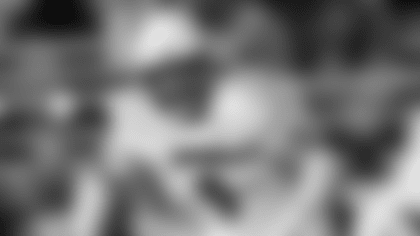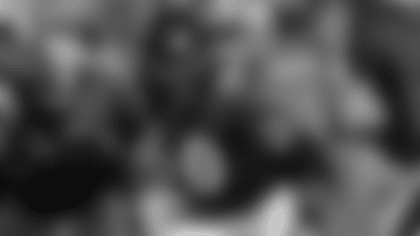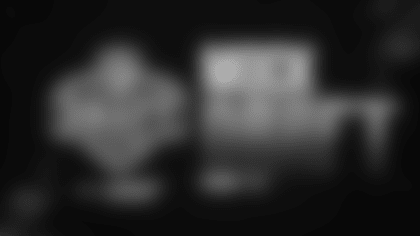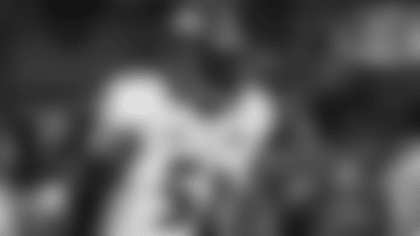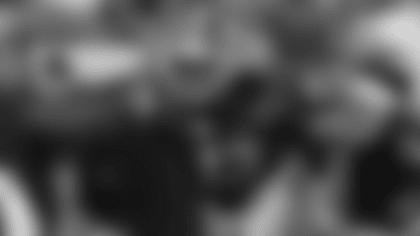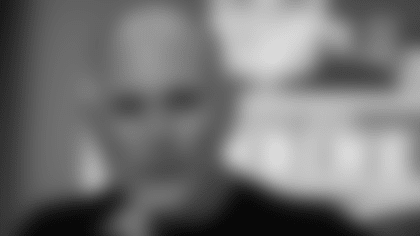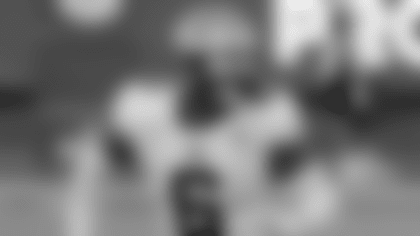This draft has been described by many analysts as the deepest draft in 10, 20, 30 years. That's rather strong terminology, but do you agree with it? (Joe Platania)
(NEWSOME) *"I'll speak first, and then I'll let both Eric and Joe talk about it. I think every draft has some strength at certain positions. And I think this draft is no different. There are certain positions where you could probably say you could get a guy in any of the seven rounds, and then there are other positions where you'd be fortunate enough to get one, maybe, after the third round. So, different drafts take on different personalities. I understand what everybody is saying about that, but from my perspective, three years later we'll make a determination how strong this draft is."
*
(DeCOSTA) *"I would say it's deep if you draft the right players. That's the challenge. There are a lot of players in this draft; we just have to draft the right guys."
*
*(HORTIZ) *"I'd say just through the process of setting the board, we've had the luxury this year of sorting through more names than less. So obviously, like 'Oz' said, some of the positions are more stacked than others, which contributes to the volume of names. But overall, I'd say it's a pretty solid draft."
Ozzie, there was a stretch of almost a dozen years where nearly every year the Ravens drafted a player who ultimately went to multiple Pro Bowls in the first round. How do you evaluate the success of your first-round picks? Are those [Pro Bowl-type] first-round picks unrealistic and you're more looking to pick a regular starter for four or five years, or how do you view that? (Jeff Zrebiec)
*(NEWSOME) *"The process is we grade the players, and we allow the tape to give us the most information. And our scouts do an unbelievable job of getting background information and bringing that to the table. What we try to do is – I guess I learned this from the very first draft I went in by Milt Davis who had played for the Colts and was a Colt scout – you check your ego at the door. And when you check your ego at the door and we allow all of the information to dictate how we are going to set the board, then we just pick the player that is available to us."
Picking at position 17 is a peculiar position for the Ravens; usually it's a little later. You've traded into the next round several times with your late pick. How do you view 17? I know you are always up for a trade, but is that one maybe more of a keeper than in previous years? (David Ginsburg)
*(NEWSOME) *"No, not necessarily. We've already gotten some calls about teams wanting to move up, but it's also based on the number of players that we have available who we think have value, and if we move back four, five or six spots, we might still have the opportunity to get one or two of those players and get the additional pick. So that's how we look at it. Can we pick at 17? We'll be prepared to pick at 17, but also we'll be entertaining trades to be able to move back if we have to, if we want to."
What affect does the draft, being later, have for your guys, and do you like the draft being later, or would you rather it moved back to its original time? (Ryan Mink)
(NEWSOME) *"Well, it has taken two weeks of my golf time away, so that's a negative. *(laughter) It is what it is. We work in the National Football League – we're one of 32 clubs – and whatever is decided, then we play along. Could we have picked this week? Yes, because I think this would have been the week if I'm correct. We would have been ready to go if we would have had to. But, we got the additional time. The thing that has probably helped the players on their visits is they probably didn't have to make four, five and six visits in one week. They were able to spread it out a little bit more. So, it has probably been less taxing on the players and then just allows us more time to dot our I's and cross our T's."
For John and Eric, how much of a priority is it to add a running back in this draft? Who do you think will be the top running back picked? (Matt Zenitz)
*(HARBAUGH) *"It's important to add a running back, but we've got some other spots, too. It's important to add an offensive lineman, a wide receiver, a tight end and some depth at quarterback. It's important to add a safety, a corner, inside backer and a defensive tackle. *(laughter) *So, that's where I'm at right now."
*(DeCOSTA) *"I think at that position you have some good players. [Bishop] Sankey is a good player; [Tre] Mason is a good player from Auburn. I think Carlos Hyde is a good player. Jeremy Hill is a good player. So, you've got guys in that second round, third-round area. You've got some good later round picks, too. [Lorenzo] Taliaferro from Coastal Carolina is a good player; saw him at the Senior Bowl. I think the draft is such at that position where you can get a guy in any round – second through seventh – that can help you play some good football."
There are a lot of quarterbacks in this draft who may or may not go in the Top 15. Obviously, you're not looking for a quarterback with your first pick, but how much will it influence who you take if those quarterbacks start going early? Will that be a big help for you? (Gerry Sandusky)
*(NEWSOME) *"Well, yes. We have Joe [Flacco], and Joe is a guy who has won a Super Bowl for us. If as many as three, four or five quarterbacks go before 17, that means other players from other positions will slide down to us. There will be more players for us to choose from. But we have no control over that, and as I've stated, we will have 17 players rated."
What has Gary Kubiak and the new offensive coaches added to the pre-draft process, and what kind of impact have they had on the preparation? (Brett Hollander)
*(HARBAUGH) *"I think – and Ozzie and Eric and Joe would all agree – that they've been great. They've added their perspective. It's always good to get new views on things and ways of looking at stuff. But their perspective on the offense and how this offense is put together and the personnel that fits it has been invaluable. [They] are good guys, they work hard at it, and they've done a good job."
When it comes to the safety position, what do you think of the safety class, and do you think it's a position where there are enough free safeties to go around? (Aaron Wilson)
*(HORTIZ) *"Some of those guys, like [Calvin] Pryor, they play both [both safety spots]. Deone Bucannon [is as well]. You'll see them both down low in the box and on the back end. Ha Ha [Clinton-Dix] is more of a traditional free safety the way they use him. But again, the safety position has become interchangeable, and we do a lot of that here as well. So, if you look at the safety position overall, you look for versatility from guys who are good tacklers, sound tacklers – not hard hitters, but guys that get them down in space – who have some coverage skill and just general instincts and football knowledge on the back end. I'd say as a whole, the class is pretty solid. You'll get some guys at the end of the first and second round – and then there will be some guys who come off in the third, fourth and fifth – who will help teams."
Ray Rice has his arraignment tomorrow, but his legal situation might not be resolved by the time the draft comes around. How much does the uncertainty around Ray Rice, your starting running back, impact what you do or your planning for the draft? (Jamison Hensley)
*(NEWSOME) *"I can say, No. 1, we'll deal with Ray [Rice] when that time comes. But, in talking with John all the way back to when we went to Jupiter [Fla.] to spend time with Steve [Bisciotti], we've been talking about adding one, maybe two running backs to our team. And this was before the incident that happened in Atlantic City. We felt like we needed to add some depth at that position coming out of the 2013 season. And even in free agency, we've been in on some backs. We haven't been able to actually get one yet, but we've been in on some pretty good backs."
Ozzie, historically you've been inclined to trade back. Is there any scenario in which you trade forward for a pick? (Peter Schmuck)
*(NEWSOME) *"I'd have to say, 'no,' because we don't have a lot of ammunition this year. We've only got three picks that are tradeable; the other four are compensatory picks. So, it would be hard to do. But I could probably say if one or two players start getting really close to us, we'd be clamoring trying to go up and get them. I can just say, I know John, I know Eric and I know Joe, and we'll be telling Steve, that we need to go get this player because we feel like he can impact us that much."
When you talk about need in this draft, do you feel like this is a draft you have to get a tackle that can come in and start right away, considering you were unable to get a tackle in free agency? (Brent Harris)
*(NEWSOME) *"We brought Eugene [Monroe] back, so that was beneficial. What we have is we like [Rick] Wagner, who we drafted last year, but 'K.O.' [Kelechi Osemele] started the first 16 games [of his career] for us at [right] tackle. So, we have some versatility there already between Wagner and 'K.O.' having the ability to go back to right tackle. If we don't come out with one in the first three or four rounds, we still feel like we could line up and play. And I think one of the most important things [to consider] is [that] the draft is great, but we have 63 players right now on our roster, and if the Commissioner asked us to play tomorrow, I think we can line up and play and be pretty good."
Daryl Smith re-signed, but Rolando McClain didn't work out. How deep is the inside linebacker position in this draft, and is that a position you feel you need to address as well? (Clifton Brown)
*(DeCOSTA) *"There are some good players. Obviously, [C.J.] Mosley from Alabama is a really good player, a highly-rated prospect. [Ryan] Shazier from Ohio State is a really good prospect as well. You've got a bunch of other guys that are good players at that position. We're going to draft the best available player. We're going to rank every player. We like Arthur Brown; we drafted him last year, as well, in the second round. Bringing Daryl back was a big thing for us. So, there are a lot of good players at linebacker, outside linebacker, all over the defense in this year's draft. We hope to get a few defensive players in here this year if we can, and linebacker will certainly be a big part of that, for sure."
Ozzie, our first chance to speak with you … What happened with Rolando McClain and his tryout? Have you lost faith with Alabama because of that? John, do you like to have prospects in individually one-on-one, sort of "Gruden-style," and drill the guy to find out what he's all about? (Jerry Coleman)
(NEWSOME) "That's a three-part question. The first part is, 'Have I lost faith in Alabama?' My son is still there. (laughter) I think that takes care of that one. Rolando retired. At the end of the day, a person has to make a decision whether he wants to play football or not play football. It was his decision to retire. I think the process that we go through is a very similar process that we've done since 1996. John [Harbaugh] and I value all the information. We want all the input from as many people as we can get, and that helps us to make decisions. Whether we spend our time with the guys at the Combine, whether we bring them here, we interview guys at the All-Star games, we want as much information as we can. We try to watch as much tape as we can, and then we make a decision on the player."
(HARBAUGH) "No. That's it – it's good. I agree." (To reporter: "I thought you had a question for me?") (Reporter: "I did. I asked you about when you get the player in the room, do you talk to them individually?") *Yes, sure we do – of course we do. We talk to them a lot, [but] not Gruden-style; we do it Ozzie-style – that's how we do it. *(laughter) We do a great job of that. Just so you know, every guy that is available in the draft is being interviewed at some level. Our area scouts are interviewing, our coaches are interviewing when they get the opportunity to. It works its way up to where we see 60 [players] at the Combine, we see 30 here one-on-one between Ozzie and I. Eric and Joe are seeing even more guys too at that high level. We're interviewing every guy, and some guys on four different levels we're interviewing them and talking to them."
After losing Corey Graham in free agency, how big of a priority do you think it is to add another corner? For Joe [Hortiz] and Eric [DeCosta], could you talk a little bit about this class of corners? (Luke Jones)
(NEWSOME) *"First, it's an opportunity for Chykie [Brown] and for Asa [Jackson]. I think they're looking at the challenge. Every time I walk past Chykie, he's saying, 'This is my chance,' and I say, 'Yes, it is.' I think Asa feels the same way. We've always felt – John included, as he's now a part of this partnership – you can't have enough corners, especially when you're in a league now where it's a passing league with people putting three or four receivers in the games. You don't have too many corners."
*
(HORTIZ) "I would say corner position-wise, it's pretty solid. They go off the board fast every year. We'll see about 12 that go in the first three rounds. The top guys like Darqueze Dennard, [Justin] Gilbert, [Bradley] Roby, [Kyle] Fuller, [Jason] Verrett, they're probably going to go early. After that, you'll start to see guys like [Keith] McGill, and they're all probably going to be second round-type players. The question will be whether they are going to be the highest-rated guy when we're up. Obviously, we like corners and we're not afraid to take them. If there is one sitting there and we've got him ranked high, we'll take him."
I'm wondering how much the new CBA impacts your decision-making in the first round. In other words, the fact that the salaries now are basically slotted and you know what the 17th pick is going to make, do you sit there and think, "I like this guy enough to pay him that," and does that come in to your decision-making? (John Eisenberg)
(NEWSOME) "No, not really. When we rank the guys, we rank them as players. We do not factor in the salaries, because if he's the 17th-best player, he's probably going to get a contract that equals to that amount. The person that probably likes the CBA as much as anybody is [senior vice president of football administration] Pat [Moriarty], because he has less haggling with the agents right now. It's pretty much slotted as to the amount of money that they're going to be getting and the structure and the length of the deal. I think our owners did a very good job of making that very simple for us. The reason that's done is they want the money to go to more of the veteran players or the [younger] players when they get to their second contracts."
John, you kind of joked about your checklist, but if you had to have your No. 1 aggressive "must," what position would it be? Where are you with that? (Morgan Adsit)
(HARBAUGH) "I am somewhere with that, but I'm probably not going to share that with you." (laughter) (Reporter: "What about on draft day, as far as getting your voice out there?") "Oh, they hear me – and not just on draft day. (laughter) [It's] every day leading up to draft day. As Ozzie said, it's a partnership, and I think we do the best job. I don't know if anybody in the league could do it any better than the way we do, because Ozzie has organized the process here. It's collaboration, it's consensus, but it's also decision-making. What you're talking about are decisions you have to make, but really there is no answer at this point. When I value a position over another position because of need, because of who we have there or don't have there – or just because that position is somewhat more valuable in our eyes in the offense or defense that we're playing – all that is going to factor into it in the end. And in the end, we're going to have to put a name on a card, and in the end, Ozzie will do that, and the choice will be made. All those things you're talking about are going to factor in. For instance, how important is it for us to get a corner? Say it is the third round or fourth round? It depends if we get a corner early. If we get a corner early, we're probably out of the corner business later, no matter who the player is. The board reshuffles every night, and that is part of Ozzie's process."
Eric, the draft is considered an inexact science. You put all the work in, all the analysis, yet in the end how much do you still need to just hope and luck? (Mark Viviano)
(DeCOSTA) "I think there is a lot of luck with the draft. That's why we value picks as much as we do. The more picks you have, the more chance you have of getting lucky on a guy. Our whole mindset is to get as many picks as you can and then just pick the best available players. We try to make it a science. In the end, it's probably more art than science. We try to look at statistics and different things – analytics. In the end, it comes down to players – the motivation of the players, the passion of the players, how they fit your scheme. Injuries are a big factor, football intelligence is a big factor, toughness is a big factor. Those are intangibles; those are hard to measure. We try to do it, but our whole philosophy is to get as many picks as you can and pick as many players as you can."
(HORTIZ) "Then when a guy like Torrey [Smith] slides to the second round, you're hoping like heck he gets to you." (laughter)
Ozzie, can you describe your philosophy on compensatory picks and using them to build your roster rather than go after free agents? (Jenny Vrentas)
*(NEWSOME) *"Not to go into a whole lot of detail, because I don't care if 31 other clubs understand how we go about getting compensatory picks … We like picks; we've got an owner that likes picks; we've got an assistant general manager that likes picks; we've got a head coach that came in, and one of the first things he said is, 'Boy, we don't have enough picks for all the needs of the players that we have for our team right now.' We all like picks. What we do as far as trying to get compensatory picks … We take some stress – a lot of stress – during free agency. There are a lot of good players that sign with other teams, and we lose a lot of good players, but we maintain the patience, and we'll try to sort through other areas to get players. As partners, Steve, John, Eric, Joe and I – we love picks. When you get a lot of picks, it allows you to do things like we were able to do to get Eugene Monroe last year during the season."
You've got an owner that has famously picked people; that's what he did to become wealthy. You guys are picking people. You've got to look at the film, but you still talk to these guys. Individually, do you have a favorite question that you ask these guys – something that you really want to know? It might be different for all four of you but, when you sit down one-on-one, is there a go-to question that you need to know that separates someone's personality besides what you see on tape? (Nestor Aparicio)
*(HORTIZ) *"I'd say one-on-one, when we're bringing them into the Combine in the room as a group, you try to draw the kid's personality out. You ask him questions that loosen him up and see where he goes with it, how he carries himself, how he interacts with you, and how he communicates. When you get into the football questions, you can ask about leadership, but then you start asking, 'Give me an example of how you are a leader.' Some guys will talk about being a vocal guy or leading by example. Lead by example – they all can say that – [but I want him to] give me an example of that. That's one just to figure out how they're interacting with their teammates. Generally, when we're in there, I just sit back, ask the questions, let the room start asking questions. And we just get a feel for the guy and if he feels like he will fit in our locker room with our coaching staff and within this organization."
Last year, I believe there were three players you guys drafted outside what they used to call Division I-A. What's the challenge of evaluating the players when the body of work is against lesser competition? Secondly, do you find players at that level are increasing in ability year after year? (Bo Smolka)
(DeCOSTA) *"I think, in general, scouting has gotten better across the league. *Teams are doing better jobs, so we've tried to find value by more closely looking at small-school players. Our scouts do a great job of going out there and evaluating those guys. We use a lot of resources to go into those schools, getting to know the coaches, and watching the players. Obviously, the biggest challenge would be level of competition. How does that player play? How is he's going to play against better players? Is he going to be able to adjust? All-Star games are a nice way of seeing that play out, so we get the chance to see a small-school guy at the Senior Bowl, you get a chance to see him at the Combine to compare against the big-school guys. That's always a big challenge. The other thing is, 'How are players going to get better?' At small schools, sometimes they don't have the luxury of having a nice weight room, nutritional programs or support staff. We feel like sometimes these guys come into our facility, our building, with our coaches and our doctors and trainers, and get better quickly because they have the advantage of all these new things. It is a challenge. A lot of good small-school players have come here. We got Joe Flacco, Lardarius Webb [from small schools]. We had Cary Williams, who had been a good player with us in the past. We've had a lot of small-school players. Gino Gradkowski started 16 games for us last year at center. We believe in it. We look at all players across the board, regardless of level of competition, division or conference, and pick the best players."
Ozzie, I don't know if you're aware of this or not: Brady Quinn was on NFL Network this week, and he was telling the story of the 2007 NFL Draft. I went back and looked online, and you guys did comment back in 2007, but could you just share at all, if you're willing, how close it was? He said that he thought he was going to the Ravens with the 23rd pick. Would you be willing to share at all how that went down? (Steve Davis)
*(NEWSOME) *"Yes, I'll share very briefly. When Brady started to come down the draft [board] … Talking with Steve [Bisciotti], Eric, Rick Neuheisel and Jedd Fisch, along with Brian [Billick] … So, we started to do some work. I spoke with Tom Condon, his agent, and I spoke with Brady Quinn. What happened is we were in the midst of making a trade – a trade with the team that ended up making the trade to Cleveland – and Cleveland offered more than we did, which was Phil [Savage] – Phil offered more than we did. And so, they ended up drafting Brady Quinn, and we did not get him, because what Dallas and Jerry [Jones] wanted in the trade from the other team, we did not feel like we should go up to that level. So, Phil got the trade."
Now with the two extra weeks that weren't always there, and all the information, and misinformation that's out there … What's the process you go through to kind of vet that? You meet with these guys on your own, and then you have guys who put up this story and that story, from scout to scout, head coach to head coach. How do you decide what information you try to vet and pick up the phone and say, "Hey, what have you heard about this guy?" Or what do you block out as being chatter or noise? How do you wade through all that mess? (Mark Zinno)
*(NEWSOME) *"I try to eliminate all the noise. Watch the tape, talk to the players, talk to the people that you trust within your building and allow that to make decisions. There's probably no one as close to [Houston Texans general manager] Rick Smith as I am in the league. I have no idea what Rick is going to do with that first pick, and he's very close to me. So, to me, and I'll let these other guys talk, I just try to eliminate the noise and spend more time watching tape and more time talking to the guys that have been into the school and talked to the players. So, they give me the best information."
*(HARBAUGH) *"I might just add to that. We trust inside the building that you can't get any information from anybody in the NFL that's going to be valuable, or that you trust, but you just don't know. I talked to my brother last night, and we were in a little sparring match, 'Can I get something? Can I get something?' It's just not possible. But, we do make phone calls to people we trust in college – college coaches that you've been around, that are at a school that played a guy. That's pretty valuable – guys that you know. And then the other thing, getting back to Nestor's [Aparicio] question a little bit – which I thought was a really good question – 'What kind of questions do you ask?' It's really not one question specifically to all the players, but you have a question for each guy. So, if a player hasn't played a position or you're concerned about his mental makeup or football IQ, you're going to ask questions in that direction. You might want to try to figure out how much he knows, or how he processes, or how quickly he learns, just how football-smart he is, for instance. Other guys have other issues. You're going to try to come out of that meeting finding out about that one thing that you need to know about. Then the other thing, basically to me, this is the main character thing, is you want to find out basically what kind of heart he has. In other words, like it says in Proverbs, someone that listens to good instruction. That's part of what wisdom is for a young person. Is he willing to accept instruction, and then is he able to apply instruction to the way he plays the game or the way he lives his life? And to me, that's what you want to come out of the meeting with as a coach. You want to find out who this guy is, and am I going to be able to deal with this guy, coach this guy, help him become the best he can be? Or not? And if you don't feel like you're going to be able to do that with a player – which is rare, because most of these guys have already been coached because they've gotten this far – but if you don't feel that way about a guy, you're probably better off moving on to the next guy. And that's really a big part of it for me, in terms of asking questions."
When you look at your draft board, how many draftable players do you think there are this year? (Garrett Downing)
*(DeCOSTA) *"I think we have about 180 players. Some years we have 150; some years we've had 140. We have about 180 now. Certainly, we won't be picking [all] those guys, but our scouts have deemed those guys as draftable. That tells me that if we're doing our jobs, we should do a really nice job in undrafted free agency, because we're going to target a lot of those guys that we think are good players that don't get drafted and try to add those guys after the draft."
This year, a lot of the draft pundits are talking about how usually some guys being taken in the third round are only second-round picks, and second-rounders go in the first round. Does that add to the possibility of trading back? Does that make getting second and third-round picks even more important? (Jeff Zrebiec)
*(DeCOSTA) *"Well, we love picks. We've said that a bunch. But I think it just depends on the trade itself, who's available and what we can get. I was actually thinking about a trade that we didn't make a few years ago in 2010. We had the chance to actually trade a player that we had drafted, and it would have been a great trade picks-wise. However, we couldn't find anybody to pick. We liked the player so much that we didn't see any players close to that player. So, it just depends on the board, it depends on the amount you can get, and it's really who's available."
What is your opinion of Johnny Manziel, and do you expect a run on quarterbacks late in the first round? (Jim Corbett)
*(HORTIZ) *"He is a blast to watch. I'm a huge SEC fan, and you just put on any game, and you're going to have a lot of fun watching him. Now, he needs some polishing. He does not play in a pro-style scheme, but he may change the scheme he plays in when he gets drafted because of what he does. He's such a dynamic player. In terms of the quarterbacks, whenever the run starts, it's going to start, whether it's at the beginning of the first round, in the middle of the first round, end of the first round. At some point, teams that need quarterbacks are going to start plucking them off the board. It's so hard to predict when that's going to happen, but it probably will happen, and I'm guessing it'll come in bunches when it does."
Ozzie, when you were talking earlier about guys you would trade up for – you've done it in the past with Joe Flacco, Haloti Ngata and Michael Oher – is this a guy you looked at that you thought may drop or are you surprised sometimes when a guy drops? John, when you look at a player and whether he fits in our scheme, do you look at how this guy may be better than what we think he is in our scheme or look at another guy and say, "I don't know where he fits in?" (Stan White)
*(NEWSOME) *"For the first part, to answer your question, it's both. In some of the cases where we've traded up, we were surprised that a player had started to fall. Even last year, we were surprised that a player had started to fall that we had rated real high, and we started to try to move up to get that player. The other times when we've traded up, we just feel like we don't want to lose this player. And Joe [Flacco] is probably an example of that. We had accumulated a lot of picks when we moved from seven, eight or wherever we were, and we just felt like Joe was a guy that we couldn't afford any longer to let him sit on the board. And so we moved up to get him. So, we've utilized both of those methods to make trades."
*(HARBAUGH) *"On that Joe thing, that was a hard deal because we do love picks, and there was a lot of conversation here about, 'Let's hold on to the picks; he'll get to us.' Finally, it was that we're not going to take a chance and lose Joe. The scheme part of it, that's exactly right. We do that in our process, so it's not like we do that on draft day and say he's not a good scheme fit. We have those meetings with the coaches and the scouts together, [and] we sort them according to how they fit the Ravens. You factor in whether they fit the NFL, but we apply it to how they fit the Ravens, and that's how we sort them out."
Talking about Joe Flacco, if you had an actuarial table from somebody in insurance on what the chances are he'd get hurt one of these days, it'd be very high. It's unbelievable – six years and no major injuries at all. Is that a position you would like to get better at and have more competition at backup quarterback? (Stan Charles)
*(NEWSOME) *"Yes, but for another reason. This is Tyrod [Taylor]'s fourth year. He'll be a free agent. If the opportunity presents itself that Tyrod gets a chance to play because of an injury, then it would be hard to retain him, because this is a quarterback-driven league, and other teams would be attracted to him. For those reasons, we also need to be looking at bringing in another quarterback so we can have someone that is capable of going into the game as we move forward in 2015, 2016, 2017 and 2018 – in case we can't keep Tyrod – that we have someone who can go and win games for us if Joe gets hurt."
So, it's not a talent decision based on that? (Stan Charles)
*(NEWSOME) *"Talent is always going to drive the decision, but we also look at … Part of my job is to not only look at 2014, but I've got to be looking at 2015 and 2016 and 2017 and how the roster is going to shape itself. And you add into that our salary cap and guys that we've got the opportunity to retain or not retain. So, a lot of times we'll make a pick based on two years from now, because we know we won't be able to keep a certain player based on our salary cap."
Can I get your comment on a couple of local prospects, Kyle Fuller and Terrance West? (Scott Garceau)
*(HORTIZ) *"Both were very productive players in their careers, obviously. One went the I-A route, one went the I-AA route, but when you watch them both this year – obviously Kyle got hurt midseason – but he has put together a nice career at Virginia Tech. He's a competitive player with excellent speed and athleticism, and he comes from a very good football family. They have altogether had a lot of success, and there is one more down there. I'm looking forward to seeing how he develops as a pro. And then Terrance [is] a guy who really burst onto the scene this year. He ran through I-AA. I got a chance to see him play versus Delaware live during the regular season, and then I actually took my [sons] out there to help me scout him. They wrote down his number that he was the best player they saw, so [they're] future scouts. Lord knows they're not going to be players. *(laughter) *But what he did in the postseason was pretty fun to watch. Joe Douglas, our national scout, and I live 12 houses down from one another, and we're texting during the game different legendary backs that he looks like against Eastern Illinois as he ran for like 200-some-odd yards. He's a really productive player who has had a great year and a lot of touchdowns and knows how to find the end zone."
John, I've heard college coaches talking about on recruiting signing day, you can win or lose half of your games for the upcoming season on that day. Does that translate to the NFL? Do you feel that way on draft day? (Gerry Sandusky)
*(HARBAUGH) *"I don't think about it specifically, but you sure think about how good your team is going to be going forward. I was just watching the NFL Network, and they had the stories of different drafts, and they had the 49ers' draft the one year they had that great draft that led them to the Super Bowl Championship and Bill Walsh's comments about how they approach it and everything. That's probably the draft that brought them their dynasty. So, that got me thinking just along the lines you're saying of how important these drafts are."
When you look at the backup quarterback position with the draft versus a guy out there on the street, is it easier to go through the draft process because of cost value, or do you look at and see how the board falls to you as far as the quarterback position goes before you decide to go get a guy in free agency? (Mark Zinno)
*(NEWSOME) *"To be honest, we use both. If you just look at this year, there have been some veteran quarterbacks, especially when you bring in a new staff like we have with [offensive coordinator] Gary [Kubiak], and he has a familiarity with some other quarterbacks that he thinks understand his system that would be good to come in and serve as a backup to Joe [Flacco]. So, we look at both. We look at guys in free agency, guys who get cut from other teams, and then we move that to the draft. Then after the draft, there is probably going to be another pool of players, another pool of quarterbacks that might get pushed out based on what teams drafted, and then we'll look at those guys also."
Could you talk about the value of the running back position now, considering the shift to the passing game in the NFL? And not just what a running back can do running the ball, but doesn't how they pass protect and things like that play into what you think about as a running back? (Paul Mittermeier)
*(DeCOSTA) *"Definitely. I think you answered your own question. There are a lot of factors involved with running backs in today's football. You've got to be able to pass protect; catching the football is important. Some backs are really good in four-minute situations, goal-line situations, short-yardage situations – that's important. And then special teams … If you're a running back that is not going to be a starting running back in the NFL, if you can't play special teams, your value is diminished greatly. So that's a big challenge for our scouts is to find guys who can perform on first downs, second downs, third downs and fourth downs. That is a tough guy to find. As you're looking at backs in the third round, fourth round, fifth round, sixth round, seventh round, it's all those different factors that get factored in. Certain guys do certain things well. Other guys may not do certain things well, but may be good on special teams. That's the challenge, and it's tough to find those guys."
How many guys have you lost off the character and medical board this year? Is it comparable to past years? Like the Alabama kid, talking to some teams he's a first-round talent but he'll probably play two years in the league – [Cyrus] Kouandjio. (Vinny Cerrato)
*(HORTIZ) *"Can I say something about the Alabama guys? They've been getting beat up [in the media] a lot, and I went to Auburn. *(laughter) *These guys, they may fail physicals or be question marks, but they are tough players. They play through injuries, and they play in the NFL. Last year the running back in Green Bay [Eddie Lacy] failed physicals, and he was Rookie of the Year. So these Alabama guys, they get beat up; they play through it. Courtney Upshaw had a bad shoulder, and he's a rugged, rough guy. I hate to hear the Alabama guys get beat up [in the media] so much – and I'm an Auburn guy – because all they do is play through pain, and they have such a mental and physical toughness. They get in the NFL and they do the same thing. Sorry to strike a nerve, but I've just been hearing it so much."
How many guys have you crossed off your medical and character board? (Vinny Cerrato)
(HORTIZ) *"We lose them every year, and I don't think it's any different than any years past. If we track the numbers, it's probably one or two different. I don't think it's an issue. I think we're used to it. The doctors have their say in it, and they're going to take guys down that we liked, and it's just the process."* **
When it comes to the wide receiver position, you guys have done a lot this offseason. You brought back Jacoby [Jones]; you signed Steve Smith. Is this a position you feel you'll address in the draft, and is this a good group of wide receivers, particularly the juniors? (Aaron Wilson)
*(NEWSOME) *"I would say that's a position where you could probably draft a player in any of the seven rounds, and I think our board stacks that way. If there is an opportunity for us to add another receiver, we will definitely do it based on the way our board is stacked right now."
Newsome closing remarks:
"To kind of sum this up, as we move forward, we've still got some I's to dot and some T's to cross – especially myself and John. But I think how we've been able to progress through the years is with trust – the trust that I have in Eric and Joe and the scouts, and in the trust that I have with the coaches. And the new coaches that John has brought in this year have done an unbelievable job coming in and evaluating their position. I don't know where this draft is going to stand in the 19 years that we've been doing this, but I do trust the information and the people that will be a part of the draft, and I think that when we finish up on Sunday afternoon with the undrafted college free agents, we will bring in some players who are going to impact our football team, not only this year, but in years to come. I just wanted to take the opportunity to sum this whole thing up, [and say] how pleased [I am] and how good it is to work with the people that I work with and the jobs that they do. They make my job very easy. Thanks."


